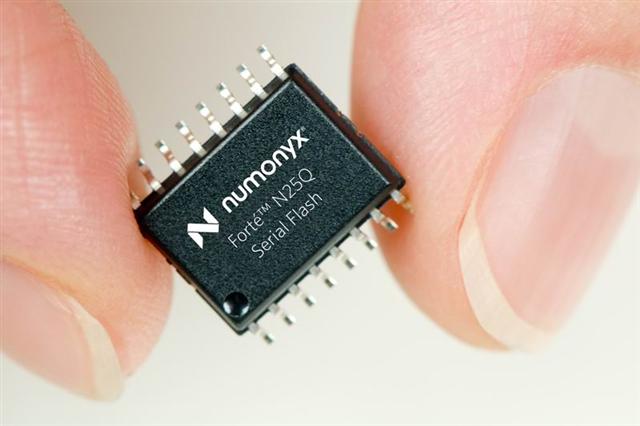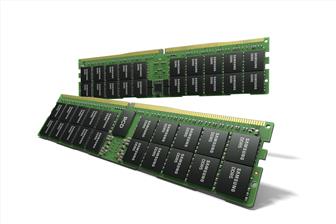
Numonyx has introduced its 65nm multiple I/O serial flash memory product line designed for embedded applications. The new Numonyx Forte N25Q serial flash family is available in 3V and 1.8V.
The N25Q serial flash memory supports multiple I/O SPI protocols (Single, Dual and Quad,) on the same device, which delivers the highest level of design flexibility to customers.
Numonyx said it has significantly improved the read and write speeds over the entire supply voltage range, improving clock speeds from 75MHz to 108MHz and up to four times, or 432MHz, in the Quad I/O mode. At both 3V and 1.8V, the N25Q is well-suited for a range of applications, including battery-operated devices such as handheld or consumer electronics.

Samsung HKMG DDR5
Samsung Electronics has expanded its DDR5 DRAM memory portfolio with a 512GB DDR5 module...
Photo: Company

Nvidia GeForce RTX 30 series GPUs
Nvidia's GeForce RTX 30 series GPUs are powered by the company's Ampere architecture. The...
Photo: Company

Apple HomePod mini
Apple's HomePod mini is the newest addition to the HomePod family. At just 3.3 inches tall,...
Photo: Company

Apple 13-inch MacBook Pro with Magic Keyboard
Apple has updated the 13-inch MacBook Pro with the new Magic Keyboard for an improved typing...
Photo: Company

Apple iPad Pros
Apple's new iPad Pros comes with the latest A12Z Bionic chip, an ultra-wide camera, studio-quality...
Photo: Company
- Silicon photonics set for takeoff (Oct 30) - EE Times
- TikTok founder becomes China's richest man (Nov 1) - BBC News
- Nvidia to take Intel's spot on Dow Jones Industrial Average (Nov 1) - Reuters
- Huawei's latest AI processors were made by TSMC (Oct 22) - Bloomberg
- Arm to scrap Qualcomm chip design license in feud escalation (Oct 23) - Bloomberg
- Embedded World brings 3,500 visitors to 1st US outing (Oct 11) - EE Times
- Preparing electronics engineering students for industry (Oct 8) - EETimes Europe
- Former Apple hardware chief Dan Riccio is retiring (Oct 11) - Ars Technica
![]() Microsoft's custom chip sets new industry benchmark while deepening AI partnerships across sectors
Microsoft's custom chip sets new industry benchmark while deepening AI partnerships across sectorsAs Microsoft transitions from a software giant to a cloud leader, with its cloud business now accounting...
![]() Global supply chain: China market
Global supply chain: China marketChina market news coverage

CSP in-house development of ASIC accelerators
Google TPUs will see a share of over 70% in the in-house developed cloud ASIC accelerator market in 2024; an all-optical network...

AI chip market outlook 2023-2028: Insights from demand and supply perspectives
The growing demand for AI computational power is accelerating advancements in hardware and chip technology, necessitating innovation...

Automotive CIS tech development, 2024
The popularization of autonomous driving is boosting demand for automotive CIS with LFM and HDR being mainstream development...






